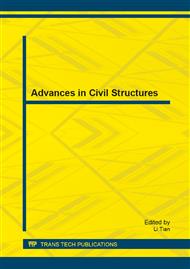p.1102
p.1108
p.1112
p.1117
p.1122
p.1130
p.1138
p.1142
p.1146
Theoretical Research on Two Improved Optimal Sensor Placement Methods
Abstract:
Optimal sensor placement technique plays a key role in structural health monitoring and structural vibration control. Based on the advantages and disadvantages of effective independence (EI) and modal kinetic energy (MKE) methods, two improved optimal sensor placement methods which are Effective Independence - Average Acceleration Amplitude (EI-AAA) method and Effective Independence - Modal Kinetic Energy (EI-MKE) method are proposed in this paper. Firstly the formulas are deduced from modal expansion of multiple-input-multiple-output (MIMO) displacement frequency response function matrix. Then a computational simulation of steel cross beam structure has been implemented to demonstrate the feasibility of the two improved methods above. The obtained optimal sensor locations using the two improved methods are compared with those gained by EI method and MKE method. Finally six classical comparison criteria are employed to demonstrate the advantage and disadvantage of these four methods. The results showed that some innovations proposed in this paper are effective and reliable. The two improved optimal sensor placement methods (EI-AAA method and EI-MKE method) can not only make the truncated mode shapes as linearly independent as possible but also enable the measured modal kinetic energy to maintain the maximum value.
Info:
Periodical:
Pages:
1122-1129
Citation:
Online since:
August 2013
Authors:
Price:
Сopyright:
© 2013 Trans Tech Publications Ltd. All Rights Reserved
Share:
Citation:


